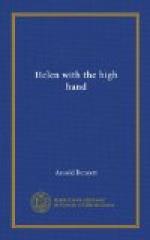So he shuffled away, and glanced out of the window at the stir and traffic of Trafalgar-road.
“Tea’s ready,” she said.
He went into the kitchen, smiling, enchanted, but disturbed. She had not come to him and confessed that she could not make tea without tea-leaves. Yet there was the teapot steaming and puffing on the table!
CHAPTER VIII
OMELETTE
The mystery lay on a plate in the middle of the table. In colour it resembled scrambled eggs, except that it was tinted a more brownish, or coppery, gold—rather like a first-class Yorkshire pudding. He suspected for an instant that it might be a Yorkshire pudding according to the new-fangled recipe of Board Schools. But four eggs! No! He was sure that so small a quantity of Yorkshire pudding could not possibly have required four eggs.
He picked up the teapot, after his manner, and was in the act of pouring, when she struck him into immobility with a loud cry:
“Milk first!”
He understood that she had a caprice for pouring the tea on the top of the milk instead of the milk on the top of the tea.
“What difference does it make?” he demanded defiantly.
“What!” she cried again. “You think yourself a great authority on China tea, and yet you don’t know that milk ought to be poured in first! Why, it makes quite a different taste!”
How in the name of Confucius did she know that he thought himself a great authority on China tea?
“Here!” she said. “If you don’t mind, I’ll pour out the tea. Thank you. Help yourself to this.” She pointed to the mystery. “It must be eaten while it’s hot, or it’s worse than useless.”
“What is it?” he asked, with false calm.
“It’s a kidney omelette,” she replied.
“Omelette!” he repeated, rather at a loss. He had never tasted an omelette; he had never seen an omelette. Omelettes form no part of the domestic cuisine of England. “Omelette!” he repeated. How was he familiar with the word—the word which conveyed nothing to his mind? Then he remembered: “You can’t make an omelette without breaking eggs.” Of course she had broken eggs. She had broken four eggs—she had broken the entire household stock of eggs. And he had employed that proverb scores, hundreds of times! It was one of half-a-dozen favourite proverbs which he flung at the less sagacious and prudent of his tenants. And yet it had never occurred to him to wonder what an omelette was! Now he knew. At any rate, he knew what it looked like; and he was shortly to know what it tasted like.
“Yes,” she said. “Cut it with a knife. Don’t be frightened of it. You’ll eat it; it won’t eat you. And please give me very little. I ate a quarter of a pound of chocolates after dinner.”
He conveyed one-third of the confection to his plate, and about a sixth to hers.




